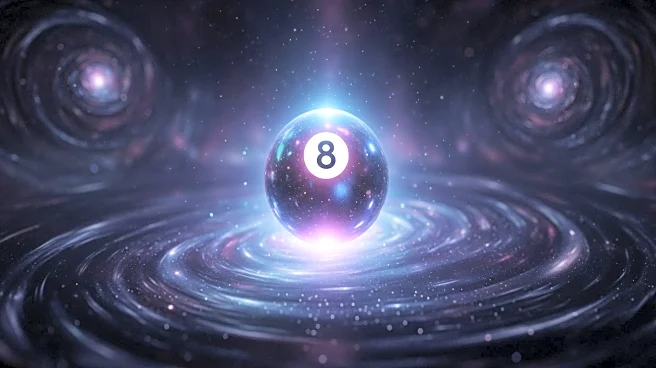What's Happening?
M. Night Shyamalan, known for his work in horror films, is set to direct a new live-action TV series based on the Magic 8 Ball toy, produced by Mattel Studios. The series is co-created by Brad Falchuk, who has previously worked on popular shows like 'Glee' and 'American Horror Story.' Shyamalan announced the project on Instagram, revealing a script titled 'Magic 8 Ball Season 1 Pilot.' The series is part of Mattel's expansion into film and television following the success of the 'Barbie' movie. The Magic 8 Ball, invented in 1946, is a toy that provides answers to yes-or-no questions when shaken. The distribution details and casting for the series have not yet been disclosed.
Why It's Important?
The development of the 'Magic 8 Ball' series signifies Mattel's continued investment in expanding its entertainment portfolio, leveraging its iconic toy brands. This move follows the commercial success of the 'Barbie' movie, which grossed $1.4 billion globally. By collaborating with renowned creators like Shyamalan and Falchuk, Mattel aims to attract a diverse audience and strengthen its position in the competitive entertainment industry. The series could potentially boost Mattel's brand visibility and drive sales of the Magic 8 Ball toy, while also setting a precedent for future adaptations of other Mattel properties.
What's Next?
As the project progresses, announcements regarding the distribution platform and casting choices are anticipated. The involvement of high-profile creators suggests potential interest from major streaming services or networks. The success of the series could influence Mattel's strategy in developing additional content based on its toy brands, such as the upcoming 'Masters of the Universe' movie and other projects in development. Industry stakeholders will be watching closely to see how the series performs and its impact on Mattel's entertainment division.
Beyond the Headlines
The adaptation of the Magic 8 Ball into a TV series highlights the growing trend of transforming nostalgic toys into entertainment content, tapping into the cultural significance and emotional connection these toys hold for audiences. This approach not only revitalizes classic brands but also explores new storytelling avenues, potentially influencing how other toy companies approach their intellectual properties. The series could also spark discussions on the intersection of childhood nostalgia and modern entertainment.











